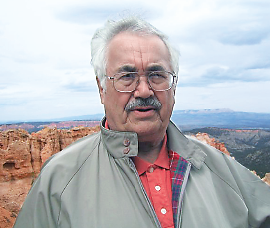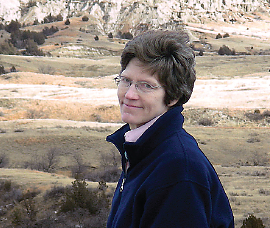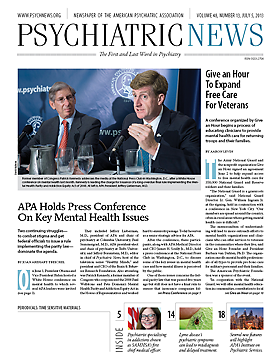Many Americans may visualize North Dakota as a bleak terrain pummeled by subzero temperatures, Arctic winds, and frequent blizzards. But North Dakota is so much more than that, notably a state undergirded by a sense of community and a can-do spirit, psychiatrists who practice there report. And they like it very much, they say.
“Now, true, the weather can be very interesting,” Cheryl Huber, M.D., a Bismarck psychiatrist originally from South Carolina, remarked during an interview with Psychiatric News. “It changes a lot. We’ve experienced blizzards, flooding, tornadoes, and hail, lots of hail.”
“And we have to think about our weather and how it relates to patient care,” Laura Kroetsch, M.D., a Fargo psychiatrist, pointed out. “A lot of times clinicians and nursing staff are thinking ahead about what the weather is going to be like so that they can be sure that patients have enough psychotropic medications. And being in the Red River Valley, we are in a flood zone as well. We have had flooding situations in which our patients had to get their psychiatric care at Red Cross shelters.”
“Because of the rural nature of our state, it is also a little bit harder to outreach to outlying communities,” Kroetsch explained. “Some clinics try to send clinicians and specialists to the different areas, but you can send people out there only so often. We are attempting to increase telepsychiatry to such areas, but right now the demand for it surpasses the supply.”
Since many North Dakotans are farmers, you also need to talk farming, Ronald Burd, M.D., a Fargo psychiatrist and former speaker of the APA Assembly, told Psychiatric News. “Perhaps it helps that I grew up on a ranch in Montana, so that when people come into my office, we talk about the sugar beet harvest and we talk about getting ready for spring planting. Also, the planting and harvest seasons take priority over medication management. I’ll tell them, ‘If you end up coming into town to get parts, give me a call, and we’ll see if we can work you in.’ ”
“I would say, based on my years here, that it takes progress a little longer to work its way here,” Huber opined. “For instance, early on, I encountered some of the old attitudes toward women in authority positions. Fortunately that has improved over the years.”
Another fact of life in the state, Huber noted, “is that you tend to get involved in the community and see your patients in all kinds of settings. Managing those interactions can keep you on your toes.”
Mental Health Care Demands Soar
The oil boom of the past four or five years in the northwest corner of the state has brought in thousands of out of staters who are looking for jobs. They run the gamut—there are truck drivers, pipe fitters, teachers, manicurists, and strippers, among others. Their ingress has overwhelmed housing and roads in that area, unleashed crime, and greatly boosted the demand for services, including mental health services, Albert Samuelson, M.D., a Bismarck psychiatrist who has practiced psychiatry for over half a century in North Dakota, reported.
Psychiatrist Madeline Free, M.D., practices in Dickinson, a once-small town that has experienced astronomical growth from the oil boom. “At least half the clients seen in the community mental health center in Dickinson have been in the state less than two years,” she said. “Their problems include anxiety, depression, alcohol or drug abuse, and relationship issues. Relationship issues are magnified due to the absence of a spouse and/or new people in their lives. Moreover, there are many social-service calls because of domestic violence, and hospital emergency rooms can’t handle the number of drug-related problems.”
To make things even tougher, there are very few psychiatrists available to help, Huber pointed out. “In the western half of North Dakota, we probably have about half the number of psychiatrists practicing than we had 10 years ago,” she said. “We could use more psychiatrists here!”
And while the oil boom has brought in a lot of money for the state—“We have a surplus of money in the treasury that you wouldn’t believe!” Samuelson exclaimed—it is yet to be directed toward more mental health services.
Nevertheless, “Historically, we have been blessed to have some legislatures that have been proactive regarding mental health care,” Kroetsch noted.
Moreover, the state’s community mental health service system is working well, “although we still need psychiatrists and services in some of the rural areas, particularly in the western part of the state,” Samuelson said. Samuelson helped implement President John Kennedy’s Community Mental Health Act of 1963 in North Dakota.
There are other compensations as well that come from living and practicing in North Dakota, psychiatrists content with life there attest.
There are above-average salaries to draw more psychiatrists to the state, Burd noted. “North Dakota is a great place to raise a family. It has exceptional outdoor recreational activities—hunting, boating, and so forth.”
“The summers are beautiful!” Huber observed.
“A nice thing about North Dakota is that there aren’t many people,” Samuelson pointed out. “I can get to work in 10 minutes.”
“People go out of their way to help you if you get into trouble,” Huber said.
Community Plays Key Role
“I would say that community is one thing that draws people into North Dakota and keeps them here,” Kroetsch observed. “Take the stress that our community experienced when the city was on the verge of flooding. The attitude was, ‘We can handle this—we can do this!’ Everybody banded together and sandbagged. Our staff did lots of sandbagging. So did a number of our patients.”
“The folks I’ve been most impressed by,” Kroetsch said, “are those who have chronic, severe mental illness and still maintain that drive, that work ethic that North Dakota is so proud of. The individuals with such illnesses are very much the same as all of us and really want to be part of the community. For example, I have a young patient with schizophrenia. Psychotropic medications helped reduce his auditory hallucinations, but they are still present and interfering with his daily functioning. Nonetheless, he is determined that he is going to be the first person in his family to graduate from college.
“All in all, the satisfaction from practicing psychiatry here is probably the same as it would be anywhere,” Kroetsch continued. “Every day, we have the amazing privilege of hearing intimate stories about people’s lives. It is rewarding to help somebody find their voice, their strength, and their resilience.” ■


